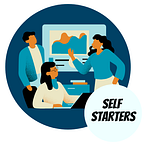Data Science Career FAQs Answered: Educational Background
Answering one of the most common questions I get asked as a Senior Data Scientist — What skills and educational background are necessary to become a data scientist?
To become a data scientist, a combination of technical skills and educational background is typically required. While specific requirements may vary depending on the organization and the role, here are the key skills and educational background that are required for entry-level data scientists —
Skillset
Mathematical and Statistical Foundation
Data science heavily relies on mathematical and statistical concepts. A fair understanding of calculus, linear algebra, probability, and statistics is essential for tasks such as modeling, analysis, and inference.
Proficiency in Programming
Data scientists need to be skilled in programming languages commonly used in data science, such as Python or R. These languages are used for data manipulation, analysis, and building machine learning models.
You can test your programming skill by working through the LeetCode Blind 75.
Data Manipulation and Analysis
Proficiency in working with data is crucial. This includes skills in data cleaning, preprocessing, transformation, and exploratory data analysis (EDA). Familiarity with libraries like pandas, NumPy, and SQL for data handling is important.
Learn everything you need to know about SQL here
You can develop this Pandas skillset by working through a few Kaggle projects —
Machine Learning and Statistical Modeling
Understanding and implementing various machine learning algorithms, such as regression, classification, clustering, and dimensionality reduction, is a fundamental skill. Additionally, knowledge of model evaluation, hyperparameter tuning, and model selection is valuable. A good course to upskill in this area is —
Data Visualization
The ability to effectively communicate insights through data visualization is important. Knowledge of visualization libraries, such as Matplotlib, Seaborn, or ggplot, and understanding design principles can help in creating compelling visual representations of data.
Check out this course to build your skillset in Seaborn — https://www.datacamp.com/tutorial/seaborn-python-tutorial
Big Data Technologies
Familiarity with big data technologies like Apache Hadoop, Apache Spark, or distributed computing frameworks is becoming increasingly important as the volume and complexity of data continue to grow.
Check out this course to upskill on Apache Spark — https://www.udemy.com/course/apache-spark-hands-on-course-big-data-analytics/
Cloud Computing technologies such as AWS, GCP, Azure will also be a plus. Check this course to upskill on AWS — https://www.udemy.com/course/hands-on-aws/
Domain Knowledge
Having expertise in a specific industry domain, such as finance, healthcare, or marketing, can be advantageous. It helps in understanding the nuances of the data and developing domain-specific models and solutions. Here are a few courses you can check out —
Educational Background
A Bachelor’s degree in a quantitative field like computer science, mathematics, statistics, or engineering is often the minimum requirement. However, many data scientists also hold advanced degrees such as a Master’s or Ph.D. in these fields.
In spite of all this, over the next few years I do expect the requirement for entry-level DS/ML roles to go down, as it did with SDE-role. At the end of the day if you are able to derive insight from data you should be able to land a job.
Final Verdict
The minimum requirements for an entry-level data science role are
- Skill sets: Programming (Python/R) and portfolio of projects demonstrating skillset in data handling, machine learning, and domain understanding.
- Education: Bachelors in Computer Scene or a Quantitative field.
Over the next few years, I expect, the requirements in the skillset section should continue to get more diverse and educational qualification to be a non-factor.
Credits: This post was developed with help from ChatGPT
